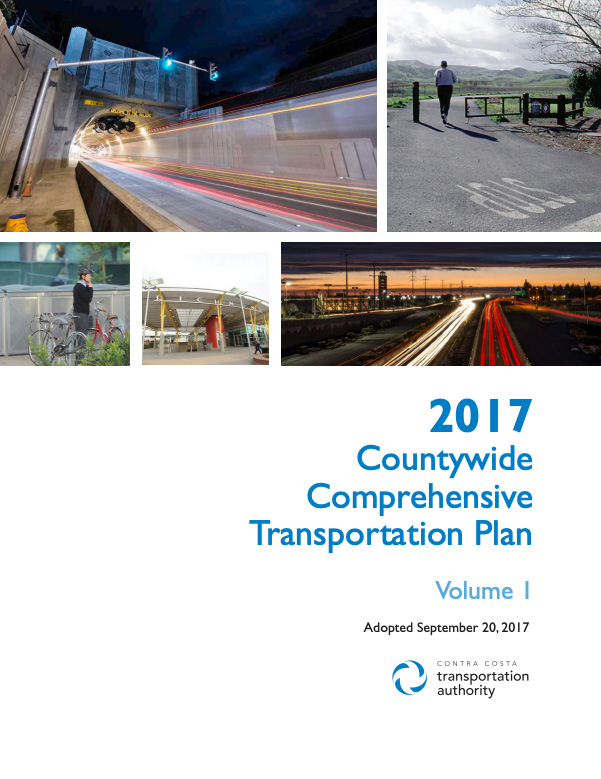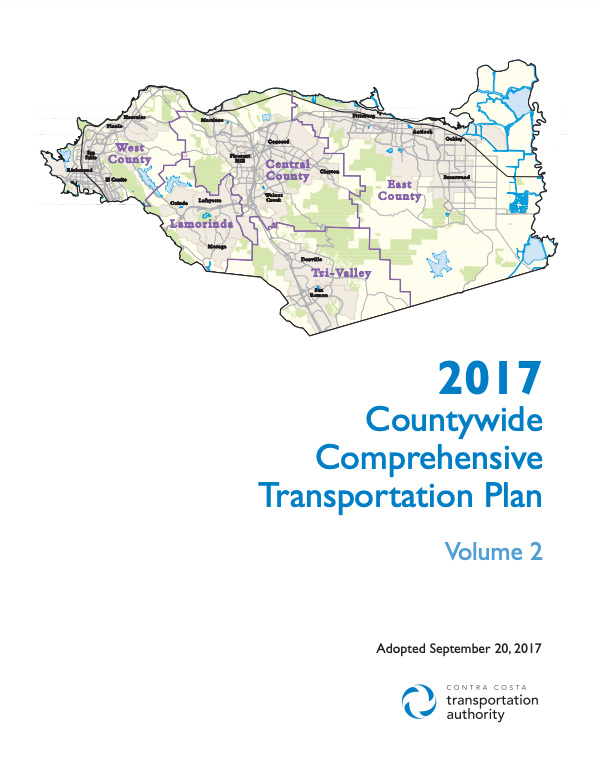2017 Countywide Transportation Plan
Overview
On September 20, 2017 CCTA adopted the Final 2017 CTP Update. The 2017 CTP is comprised of two volumes:
Volume 1 provides the Vision, Goals, and Strategies; a review of issues facing our transportation system; an overview of the cooperative planning process in Contra Costa; and an implementation plan for meeting our transportation goals.
Volume 2 contains a summary of the Action Plans, along with a performance and equity evaluation of major projects, those costing more than $25 million.
- Overview
- Action Plans
- Environmental Impact Report (EIR)
- Updates
Action Plans
As part of the 2017 update of the Countywide Comprehensive Transportation Plan (CTP) the Regional Transportation Planning Committees (RTPCs) updated their Action Plans for Routes of Regional Significance. The Action Plans are intended to establish quantitative service objectives by which we can gauge the progress of our transportation system and assess the impacts of landuse decisions on the regional transportation system. Each Action Plan identifies a system of Regional Routes – those freeways, arterials and other facilities that provide the main connections throughout Contra Costa’s communities. The Action Plans help local jurisdictions meet the requirement of the Measure J Growth Management Program (GMP) that requires local jurisdictions to participate in a cooperative, multi-jurisdictional planning process.
Each Action Plan includes:
- Long-range assumptions about future land use based on local general plans and regional forecasts
- Overarching goals that articulate CCTA’s vision for the future
- Adopted Multi-modal Transportation Service Objectives (MTSOs) that include a quantifiable measure of effectiveness and a target date for achieving that objective
- Specific actions to be implemented by each participating jurisdiction
- Requirements for consultation on environmental documents among participating localities
- Procedure for review of impacts resulting from proposed local General Plan amendments that have the potential to influence the effectiveness of adopted Action Plans.
The RTPCs developed the first Action Plans in the early 1990s and updated them in 1999-2000 and 2009. To view the final September 2017 updates to the Action Plans please click on the document links below.
- Overview
- Action Plans
- Environmental Impact Report (EIR)
- Updates
Environmental Impact Report (EIR)

On September 20, 2017, CCTA certified the Final EIR for the 2017 Countwide Transportation Plan (CTP). The Draft EIR was released on June 16, 2017. The comment period on the Draft EIR was open until August 1, 2017. Following the close of the comment period, CCTA prepared the responses to comments which were distributed to all commenters on September 1, 2017.
The EIR evaluated the Long Range Transportation Program (LRTIP) in the 2017 CTP. The LRTIP consists of $6.447 billion in multi-modal projects and programs.
In addition to the No Project alternative the Draft EIR evaluates two alternative investment options as well as the projects in the Regional Transportation Plan (RTP) prepared by the Metropolitan Transportation Commission (MTC).
Updates to the Action Plans and CTP
Action Plan Updates
While the Action Plans were updated for Routes of Regional Significance in 2017, they were last comprehensively updated in 2013. Local and State transportation priorities have evolved significantly since then. County Measure J in 2004 focused on roadway capacity and congestion, particularly on roadway Routes of Regional Significance. Over time, however, transportation planners, decision-makers and the public have become concerned with other aspects of the transportation system. The adoption of Senate Bill 743 in 2013 shifted the focus of transportation planning statewide from performance-based analyses to transportation, land use, and planning decisions which encourage infill development, promote public health through active transportation, and reduce greenhouse gas emissions.
Therefore, in 2020, CCTA reoriented its guiding Growth Management Program to focus not only on regional roadways, but also on the transportation networks serving bicycles, pedestrians, and transit. In addition, feedback from local jurisdictions and transportation staff identified several additional new transportation priorities: safety, equity, climate change, and technology.
Each Action Plan, once updated, will identify factors that impact transportation in Contra Costa, including roadways, transit, and bike and pedestrian facilities that provide the main connections throughout Contra Costa’s communities, as well as safety, equity, climate change, and technology best practices to improve our transportation access, choices, and resiliency in the face of climate change.
Countywide Transportation Plan Updates
In the past, CCTA has first updated the CTP, then updated the Action Plans based on the CTP update. However, CCTA recognizes that the Action Plan update process provides a unique opportunity for each Action Plan to focus on the needs of each subarea. Therefore, CCTA is working with local land use and transportation leaders to update each Action Plan specific to the needs of that subarea, and then the updated Action Plans will serve as the foundation of the new CTP. This allows CCTA to implement transportation and planning improvements for the entire region while better meeting the needs of each subarea. CCTA and its member jurisdictions envision the CTP as a bold, inclusive document that will guide Contra Costa’s transportation vision through 2050. The CTP Update will implement the updated Action Plans, with focus on VMT reduction, multi-modal transportation, safety, equity, climate change, and technology.
For more information and to get involved in these updates, visit the current Countywide Transportation Plan page.

